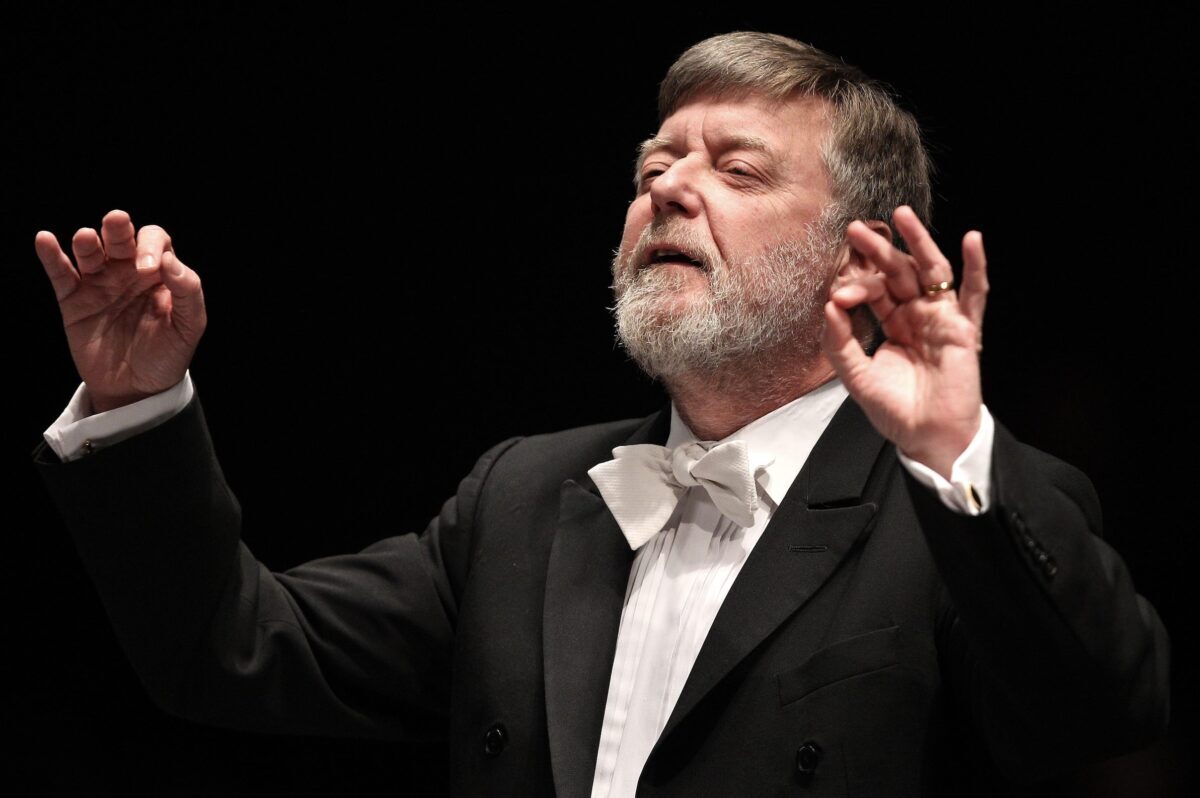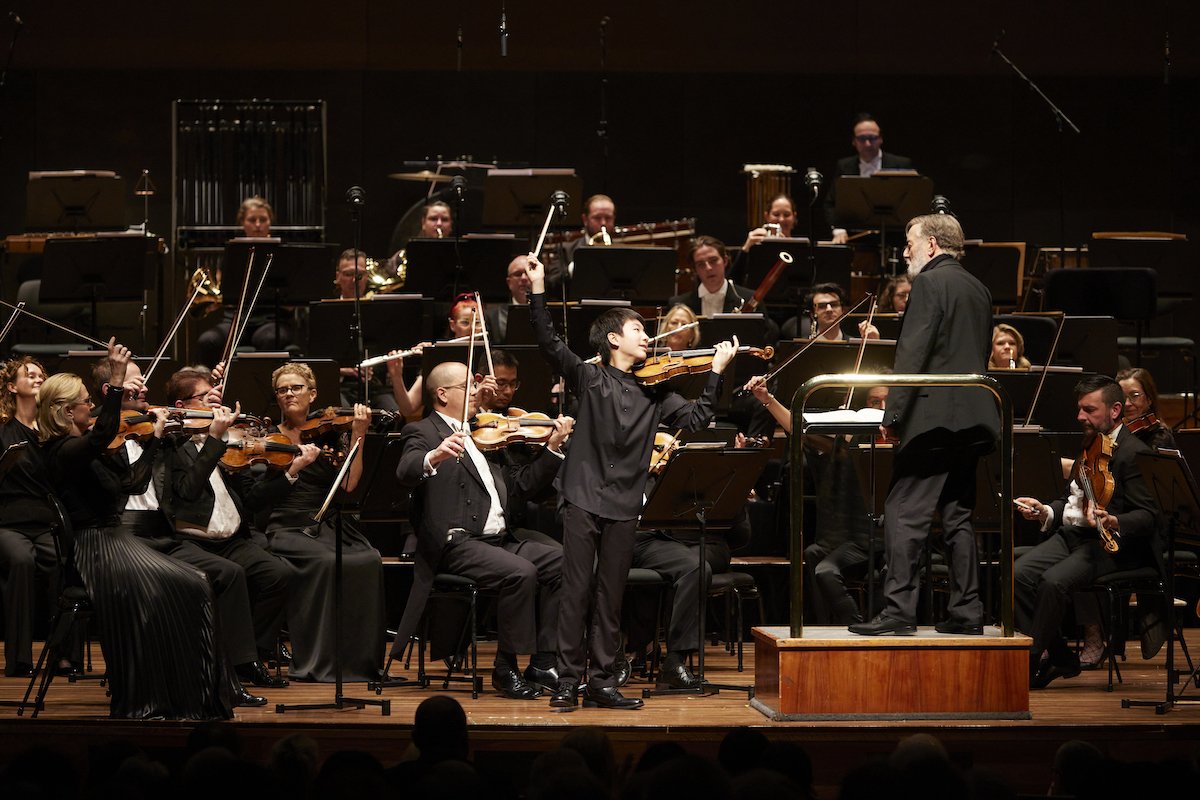The British conductor Sir Andrew Davis died in Chicago on Saturday. He turned 80 in February this year and had been undergoing treatment for leukaemia.

Sir Andrew Davis, 1944-2024. Photo © Lucas Dawson
Renowned for his insightful conducting and unwavering dedication to the art form, the news has sparked an outpouring of tributes on social media platforms.
“We are deeply saddened to hear that Sir Andrew Davis has died,” wrote a spokesperson for the BBC Symphony Orchestra and Chorus on X (formerly Twitter), adding that Davis was “a vital force in British music for many decades and a friend to us all. He will be greatly missed.”
The English pianist Kathryn Stott wrote:
“I couldn’t have wished for anyone else to conduct my final concerto performance in 2018. I can remember the rehearsal and concert as if it were yesterday. So very grateful. What absolute service and dedication to music.”
Australian soprano Helena Dix wrote:
“Heaven has received one of the good ones. A true gent and musical giant. R.I.P Maestro.”
The news will sadden many Australian classical music lovers. Among other engagements, Davis was Chief Conductor of the Melbourne Symphony Orchestra from 2012–2019 and he was scheduled to conduct Elgar’s Enigma Variations with the Sydney Symphony Orchestra in October this year.
A musical life
Davis was born in Hertfordshire, England. His early musical education included study at the Royal College of Music in London, where he excelled in piano and composition. His interest in conducting blossomed during his time at King’s College, Cambridge, where he served as organ scholar. He honed his conducting skills in Rome in the late 1960s under Franco Ferrara.

Christian Li performs with Sir Andrew Davis and the Melbourne Symphony Orchestra, 2022. Photo © Laura Manariti
Davis’ first major post was as associate conductor of the BBC Scottish Symphony Orchestra, beginning in 1970. In 1975, he became music director of the Toronto Symphony Orchestra (TSO), a post he held until 1988 when he became music director at Glyndebourne. He remained there until 2000.
In 1989, he was appointed Chief Conductor of the BBC Symphony Orchestra and during his tenure, restored the tradition established by Malcolm Sargent of the Chief Conductor of the BBC SO conducting the Last Night of The Proms and he became noted for his warm and often humorous Last Night speeches.
In May 1992, Davis was appointed Commander of the Order of the British Empire (CBE) and in the 1999 New Year Honours he was appointed a Knight Bachelor. In 2002, he conducted the Prom at the Palace concert, held in the gardens of Buckingham Palace as part of the celebrations for the Queen’s Golden Jubilee.
Davis became music director and principal conductor of the Lyric Opera of Chicago in 2000 and served there for two decades. His work in Chicago included his first conducting of Der Ring des Nibelungen (2005) and the first Chicago production of Michael Tippett’s The Midsummer Marriage.
In June 2012, the Melbourne Symphony Orchestra named Davis its chief conductor with an initial contract of 4 years. In July 2015, the MSO extended Davis’ contract into 2019.
Davis conducted the MSO on tours to the UK/Europe (2014), China (2016 and 2018) and the United States (2019). He also led the Orchestra on several recordings, including works by Ives and Goossens, as well as Australian composers Carl Vine and Percy Grainger.

Sir Andrew Davis. Photo courtesy Melbourne Symphony Orchestra
“Sir Andrew conducted almost an entire Mahler Cycle with the MSO, and it was one of our greatest regrets that our performances of Mahler’s Eighth Symphony – which were to feature more than 1,000 performers – were not able to come to life due to the pandemic,” said MSO Managing Director Sophie Galaise. “We were thrilled to reunite with him in late-2022 when he visited to conduct his own orchestration of Handel’s Messiah.”
Davis contributions to the world of opera were no less impressive. He conducted at leading opera houses, including the Metropolitan Opera, the Royal Opera House, Covent Garden, and the Lyric Opera of Chicago. His interpretations of works by Wagner, Verdi, and Mozart have captivated audiences and garnered widespread acclaim.
A large and award-winning discography documents Davis’s artistry. 2022 saw the release of his recording of Berg’s Violin Concerto/Three Pieces for Orchestra with the BBC Symphony Orchestra, as well as his recording of orchestral works of Carl Vine with the Melbourne Symphony Orchestra (nominated for an ARIA award for Best Classical Album).
Other recent Davis-conducted titles include the works of Berlioz, Bliss, Elgar (winner of the 2018 Diapason d’Or de l’Année – Musique Symphonique), Finzi, Goossens, Grainger, Delius, Ives, Holst, Handel (nominated for a GRAMMY in 2018 for Best Choral Performance), Massenet (winner of the 2021 JUNO Award for Best Classical Album: Vocal or Choral) and York Bowen (nominated for a GRAMMY in 2012 for Best Orchestral Performance).
His recordings with the BBC Symphony Orchestra and Chorus celebrating British composers from Teldec’s The British Line series was recently released as a 16-CD retrospective collection by Warner Classics.












Comments
Log in to join the conversation.